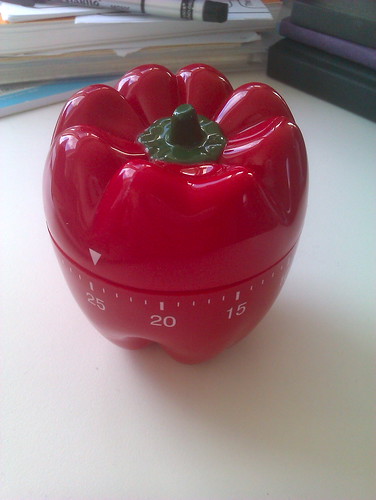
First off, let me give credit, I did not create this, and many of you have already heard of it. It was created by Francesco Cirillo and here is his site.
Secondly, because I'm sure a lot of you have heard of this, I don't want to cover the steps in detail. I know people have been talking about this technique for a long time and in great detail. What's different about this post? I'm suggesting you actually try it.
The Pomodoro Technique
- Decide on the task to be done.
- Set the pomodoro timer (traditionally to 25 minutes).[1]
- Work on the task until the timer rings. If a distraction pops into your head, write it down, but immediately get back on task.
- After the timer rings, put a checkmark on a piece of paper.[7]
- If you have fewer than four checkmarks, take a short break (3–5 minutes), then go to step 1.
- After four pomodoros, take a longer break (15–30 minutes), reset your checkmark count to zero, then go to step 1.
The Pomodoro technique is so simple. Actually doing it, on the other hand, is much harder. The difficult part is actually fully focusing on one thing for 25 minutes without breaking concentration. There is no shortage of applications and plugins and gizmos to help you out, but they are all useless if you don't do your part of focusing and doing the work. This is not to say that the tools are bad. Different Pomodoro tools can be useful, but they are just a tool, not the technique. Running a Pomodoro clock while you browse Facebook is not making you more productive (assuming you don't browse Facebook for a living).
Just do it, but do all the steps. I can tell you from experience, as I have messed up the technique in pretty much every way you can think of, that all the steps are needed. If you don't have one task, you will get side tracked. If you don't set the timer you'll over or under work (25 is a recommendation, if you need more or less adjust accordingly.). If you don't take the breaks you'll burn out too fast. All the pieces are synergistic and need to be in place to get the most out of the technique.
You need to find out what works for you and make it your own. I like to have a physical sheet of paper to write down distractions and to make my tactile checkmarks, but I imagine some of you just don't use paper. The important part is to figure out what works for you. I use over the ear headphones to block out as much sound as possible and also to discourage interruptions. Again that might not be for you, but I'm terrible at ignoring conversations. I use RescueTime to block distracting websites, so even if I tried to get sidetracked it prevents me from going anywhere. Finally, I actually have one pomodoro every morning of taking care of all the little administratrive tasks that I need to do for my job and all other miscellaneous tasks. I know some of that stuff could probably go into my break times, but I like to have as clean of a working slate as I can and little todos will bug me all day.
One of the big tips I've read and tried is to set targets for daily and weekly completed Pomodoros. This will give you an accurate idea of how much actual work you are getting done, and how much work you can get done. We all know that the hours you spend at work are not really a good reflection of how much actual work you get done. Pomodoros on the other hand, give a much better estimate of actual productive work being done.
"So, yeah, that seems slick and all, but what's in it for me?" The real reason why I think this technique is awesome is not to increase the amount of work you get done. That is a nice side effect. The real reason is that by concentrating your productive working time you actually create more free time. Getting in higher quality working time will get more done faster. This means you can use the time you would have previously been doing low quality/high quantity work to concentrate on other things. What could you do with a few extra hours a week?
More information.
Get Started Pomodoro.com
John Sonmez Simple Programmer
No comments:
Post a Comment